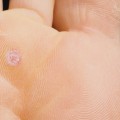If you or your partner have been diagnosed with genital warts, it's essential to take the necessary steps to prevent them from spreading. The best way to protect against some types of the virus that cause most cases of genital warts is to encourage your partner to get the HPV vaccine. Additionally, using a condom every time you have vaginal, anal, or oral sex is the most effective way to avoid transmitting genital warts. It's also important to inform your sexual partners that you have genital warts before having sex.
Medications are available that can help eliminate genital warts. These medications are usually more effective than a placebo and almost as effective as standard topical medical remedies. The HPV vaccine can also protect against certain types of HPV, including those that cause genital warts and certain types of cancer. Some studies suggest that certain vegetables may be effective against genital warts. However, home remedies are more likely to be successful when used in combination with standard medical treatments.
It's also important to get screened for sexually transmitted diseases during routine checkups with a doctor or nurse. Once you know that you have genital warts and HPV, it's essential to share this information with your sexual partners. If you think you may have genital warts, it's important to schedule an appointment with your GP or contact local sexual health services. A doctor can diagnose and treat genital warts. It's also important to be aware that you can spread the virus that causes genital warts through microtears in the skin. For example, if a man shaves over a wart and then shaves his face, he may get new warts in the beard area.
If this happens, it's essential to stay calm and talk about all the ways that exist to prevent the spread of genital warts. Finally, it's important to remember that there is no test for genital warts and it's possible that something similar to genital warts is actually another condition, such as herpes or a bacterial infection. The HPV vaccine offered to girls and boys in the United Kingdom can protect against cervical cancer and genital warts.










